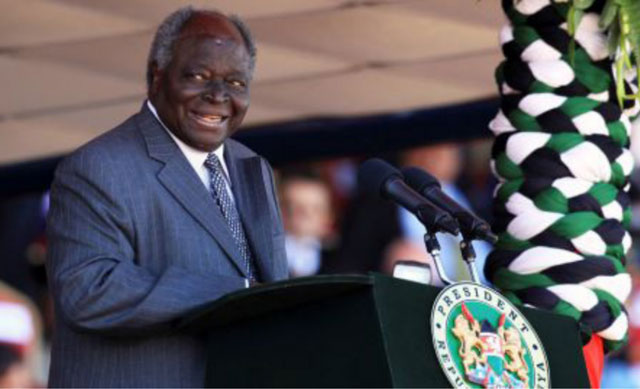
Mwai Kibaki, third President of Kenya, dies at 90 | Hailed for focusing on Kenya’s economy
OBITUARY | IAN KATUSIIME | President Yoweri Museveni had just left Nairobi, the Kenyan capital, on April 21 after a meeting with his Kenyan counterpart Uhuru Kenyatta when Mwai Kibaki was pronounced dead the following day. It was the second former President of Kenya dying in just two years.
But even before Kibaki breathed his last on the afternoon of April 22, Museveni looked set to outlast two Kenyan presidents in their combined two terms. Kenyatta’s term ends in August and he has already endorsed Raila Odinga, a rival-turned-ally for the top job.
The circumstances that brought Kibaki to power in Kenya were similar to those shaping up back in Uganda in the early 2000s as opposition to Museveni’s rule coalesced around Dr. Kizza Besigye, a former Museveni compatriot.
Opposition forces in Kenya that wanted President Daniel arap Moi out backed Moi’s former vice president Kibaki in the famous campaign dubbed ‘Kibaki Tosha’. The election of Kibaki in late 2002, after he survived what many called a freak accident, was the end of political parallels with Uganda as Kenya embarked on a two term presidency.
In contrast, Uganda took a different path as plans were laid to amend the constitution to remove term limits and enable Museveni run for an unprecedented third term in 2006.
Kibaki who died at 90 has been praised for being an astute economist who eschewed political empire building for a focus on Kenya’s economy that saw the country develop as an infrastructure hub during his term of office from 2002-2013.
The most vivid emblem of Kibaki’s infrastructure legacy was the construction of the Thika superhighway; the eight lane 50km highway that links Nairobi to Thika, an industrial town in Kiambu County, central Kenya. In similar fashion, Museveni developed a tunnel vision for developing infrastructure as a vehicle for growing Uganda’s economy.
Kibaki’s re-election bid in December 2007 was marked by anarchy as the country descended into post-election violence that killed an estimated 1000 people in clashes that lasted over three months. After an internationally brokered unity government was formed with the opposition, Kibaki embarked on a quiet rebuilding of Kenya’s economy left in almost total ruin.
In 2013, Kibaki gracefully stepped down and was replaced by a Kenyatta-led coalition that was typical of similar efforts in the past to form new governments in Kenya.
Kibaki’s Makerere era
Before he ascended to Kenya’s aristocratic political class, Kibaki was known as a brilliant academic. Kibaki was one of Makerere University’s most renowned alumni. He earned a scholarship to join the then Makerere College (now Makerere University) – where he pursued a Bachelor of Arts Degree in Economics, History and Political Science. He graduated in 1955 with a First Class Bachelor of Arts degree, according to the university website.
He also served as Vice Chairman of the Makerere Students Guild (1954-1955). In 1955, he enrolled at the London School of Economics in the U.K. for a Bachelor of Science in Public Finance, and graduated with distinction in 1958. He then served his alma mater-Makerere University as an Assistant Lecturer in the Department of Economics from 1958 to 1960.
Later in his presidency, Kibaki was honored by Makerere with an Honorary Doctorate of Laws on January 24, 2012.
The then Kenyan president lauded Makerere, which is celebrating 100 years this year, for its tutelage. “This recognition is a great honour to me, my family and country. I shall cherish it for the rest of my life. Being here has triggered a great sense of nostalgia for the many years I studied and lectured at this great institution.”
Emilio Stanley Mwai Kibaki was born on November 15, 1931 in Nyeri in the central highlands of Kenya. He was an active player on Kenya’s political scene and served in government from the time Kenya attained independence in 1963.
That same year, Kibaki was elected MP for Donholm constituency in Nairobi (now Makadara). Thereafter he served in various ministerial capacities including Finance, Commerce, and Industry. When Vice President Moi took over power in 1978, he appointed Kibaki as his vice president until he was sacked in 1988 after fallout with Moi.
Kibaki joined opposition in 1991 and became a key actor as the country prepared for the 1992 elections where he ran for president. He ran for president again unsuccessfully in 1997, contested again in 2002 and defeated Uhuru Kenyatta, Moi’s anointed successor.
The third president of Kenya has been praised for his liberal reforms including a new Kenyan constitution that was passed in 2010. The constitution was hailed as one of the most progressive on the African continent. It introduced a devolution system that created county governments akin to federal states. The elder statesman is survived by four children.
 The Independent Uganda: You get the Truth we Pay the Price
The Independent Uganda: You get the Truth we Pay the Price



